Bird Cage Door Replacement: Essential Tips for Owners
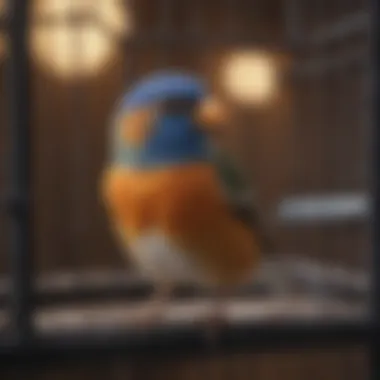
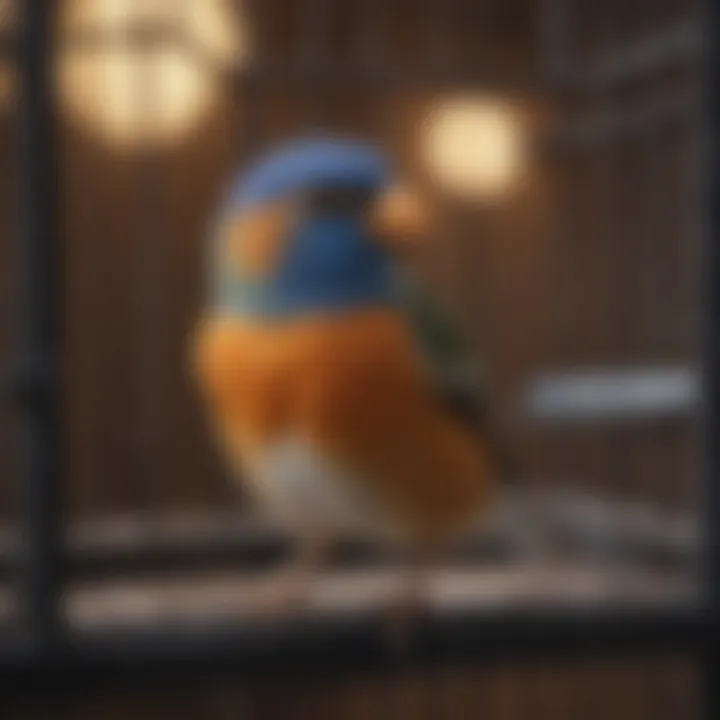
Intro
When it comes to bird care, the well-being of our feathered friends is paramount. One often overlooked aspect of maintaining a safe and nurturing environment for birds is the condition of their cage door. A compromised door can pose risks, not just in terms of escape but also in structural stability. This guide aims to walk you through the essential steps needed for replacing a bird cage door.
Not only will we address the practicalities of choosing the right materials, but we’ll also delve into factors like safety and comfort, ensuring your avian companions are housed in a space that allows them to thrive. Let’s get the ball rolling on how to ensure that your bird's home remains a fortress they can feel secure in.
Care Tips
Ensuring the upkeep of a bird cage involves more than just the door replacement, though that’s a significant aspect. Here’s how you can provide comprehensive care for your birds.
Daily Care Routines
Routine care for your birds helps foster a healthy environment. Spending time daily to check on your birds should include:
- Observing their mood and activity
- Changing water and fresh food
- Spot cleaning any mess.
Cage Setup and Maintenance
An effective cage set up involves positioning the cage in a location away from direct sunlight and drafts. Do check:
- The size of the cage is appropriate for your bird's species
- Accessories like perches and toys are suitable and placed strategically.
Hygiene and Cleaning Practices
Cleaning isn’t just a chore; it’s a vital aspect of preventing illness. Here are some key practices:
- Use bird-safe cleaning solutions
- Clean perches, cage floors, and toys regularly.
- Replace bedding material weekly or sooner if soiled.
Seasonal Care Adjustments
As the seasons change, so do the needs of your birds. In colder months:
- Ensure the cage is insulated
- Add extra blankets or coverings at night. During summer, make sure there’s adequate ventilation and a shaded area.
Behavioral Insights
Understanding your bird’s behavior can make a world of difference in your caregiving.
Understanding Bird Body Language
Birds communicate through body language. Familiarize yourself with:
- Fluffed feathers: they may be feeling unwell or cold.
- Chirping or whistling: often indicates happiness or playfulness.
Common Behavioral Issues and Solutions
Sometimes, birds can exhibit behavior that may seem alarming.
- If your bird is overly aggressive, it might be territorial. A change of scenery can help.
- Feather plucking can be a symptom of stress or illness, so consult an avian veterinarian if behavior persists.
Positive Reinforcement Techniques
Training your bird is part patience, part reward. When they perform a desired behavior, a treat or verbal praise can go a long way in building trust.
Social Interaction Needs
Birds are social creatures by nature. It’s vital you invest time in interacting with them. They thrive in an environment that offers both stimulation and companionship.
Nutrition Guides
Appropriate nutrition is essential for your bird's health.
Essential Diet Components
A well-rounded diet generally consists of grains, seeds, and fresh fruits or vegetables. Examples of nutritious options include:
- Leafy greens like kale and spinach
- Fruits such as apples (without seeds) and berries.
Safe and Toxic Foods
Do your homework! Some foods that are safe for humans can be harmful to birds. Here’s a quick list of both:
- Safe: Cooked rice, beans
- Toxic: Avocado, chocolate
Supplements and Treats
Occasionally, you might want to add in supplements to ensure they're receiving the right vitamins and minerals. Always choose high-quality products from reputable brands.
Feeding Strategies for Different Species
Remember that different species need different meals. Research is key here, as specific birds have unique dietary requirements.
Wellness and Health
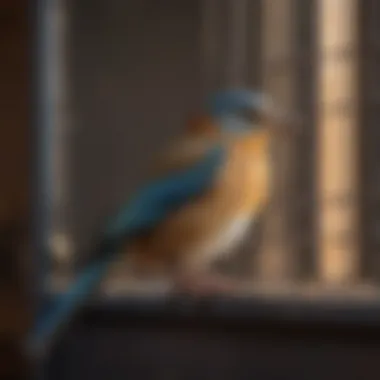

Keeping your birds healthy isn't just about diet. It encompasses a holistic approach to their well-being.
Routine Health Checkups
Schedule vet visits once a year or according to issues that come up. Regular check-ups can help catch any potential problems early.
Identifying Symptoms of Illness
Stay alert for signs of discomfort or illness. This might include loss of appetite, lethargy, or unusual vocalizations. If you see any of these, don’t hesitate to reach out for professional advice.
Preventative Care and Vaccinations
Preventative care goes a long way. Ensure your birds are up to date with any vaccines recommended by your veterinarian.
Mental and Emotional Well-being
Birds are intelligent and emotionally intelligent animals. They need stimulation and social interaction to stay at their best.
Enriching Activities
Stimulating your bird's mind is just as important as their physical health.
Toys and Playtime Ideas
Invest in a range of toys, from chewable to interactive types. Rotate them regularly to keep your birds engaged.
Training and Tricks
Training your birds to do tricks can not only enrich their lives but strengthen your bond. Simple tricks can include step-ups and spins.
Outdoor Activities and Interaction
Supervised outdoor time can provide a world of new sights and sounds, boosting both their mood and well-being. Just ensure their safety with harnesses or secure perches.
DIY Projects for Mental Stimulation
Consider simple DIY projects, like creating foraging boxes to challenge your birds and cater to their natural instincts.
Adopting these tips can elevate your bird-keeping experience, making it not just manageable but also enjoyable for both you and your avian companions.
Understanding the Importance of a Secure Bird Cage Door
A secure bird cage door may seem like a small detail in the grand tapestry of pet ownership, but its significance can’t be overstated. For avian companions, the door is not just a functional feature; it plays a critical role in their overall safety and well-being. When we delve into why this single element deserves attention, it helps in creating an environment where birds can thrive, all while providing ease of access for their caretakers.
The Role of the Door in Cage Design
In the intricate design of a bird cage, the door functions as the gateway to the outside world. It's often the first line of defense against potential threats, be they other household pets or environmental hazards. A well-designed door incorporates both accessibility and security, allowing for interaction without risk.
The door’s structure can vary—a sliding design may be more space-efficient, while a hinged one can provide a more traditional approach. Each type has pros and cons depending on the cage's layout and the species of bird. For instance, larger birds like macaws might need sturdier doors to withstand their strength, while smaller ones like finches can thrive with lighter options. Assessing the door’s material and locking mechanism becomes paramount, as these factors contribute to the overall sturdiness of the cage, thereby ensuring that the door effectively serves its purpose.
Safety Considerations for Pet Birds
Every bird owner needs to prioritize safety, and the door plays a crucial role in that. A loose or faulty door can lead to a plethora of potential dangers. Imagine a scenario where your pet bird is left unattended and manages to push open a sliding door that isn’t secured tightly. The end result can be disastrous, as the little one could escape or, even worse, be harmed by other pets or hazards in the house.
Key considerations for ensuring safety through a secure door include:
- Lock Mechanisms: Simple latches might not be enough for intelligent birds like African Greys or budgerigars, who are known for their ability to learn and unlock certain mechanisms.
- Material Strength: Metal doors are generally more reliable than plastic ones, particularly when dealing with larger birds who have stronger beaks.
- Proper Fitting: Gaps in door frames can turn into escape routes. Ensuring the door fits snugly helps prevent any mishaps.
Establishing a safe environment means routinely inspecting the door and the entire cage structure. Catching issues like frayed hinges or warped frames early can save pet owners a world of trouble.
A secure bird cage door is not merely about aesthetics; it’s about providing peace of mind for pet owners and ensuring a safe haven for our feathered friends.
Common Issues Leading to Door Replacement
Replacing a bird cage door is not just a matter of aesthetics; it involves addressing various common issues that can arise over time. Each problem carries its own implications, and understanding these can save bird owners time, money, and stress. A well-maintained door is vital for the safety and comfort of your feathered companions. It’s one of those things that might not cross your mind until you've got a problem on your hands. Let's delve into the specific issues that can lead to needing a replacement door.
Wear and Tear Over Time
Like anything that gets consistent use, a bird cage door is subject to wear and tear. Over time, hinges may become loose, and the paint may chip. You might notice your door doesn’t close as tightly as it once did. It’s like that old pair of shoes you love; they might still look okay from a distance, but they’re definitely past their prime.
Regularly inspecting your door for signs of aging is key. If you’re seeing rust on metal doors or significant scratches on wooden ones, it might be time to consider a replacement. Not only does wear compromise the door's functionality, but it can also pose a safety risk. Unstable doors can accidentally swing open, allowing your bird a dangerous escape route or exposing them to potential threats from the outside.
Damage from Chewing and Biting
Birds are naturally curious creatures, and many will chew and bite on their cage’s door. They take to gnawing on things like there’s no tomorrow, especially if they're bored or trying to communicate their displeasure. This behavior can lead to unsightly damage that not only affects aesthetics but also the integrity of the door itself.
Wooden doors, in particular, are susceptible to this kind of damage. If you observe gnaw marks or splintering, it may not be long before the door compromises completely. Metal doors may bend or become dented, which can affect how well the door seals.
A great solution is to provide your birds with appropriate chew toys to channel their energy. That can help slow down the door's deterioration, but sometimes, even with the best-prepared plan, a replacement is inevitable.
Faulty Mechanisms and Locks
Another common issue revolves around the door's locking mechanism. If the lock doesn’t work properly, it can result in a door that won’t close securely. This situation can be downright scary, especially for pet owners who want to ensure their bird is safe at all times. The mechanisms can fail due to various factors, like rust or simple mechanical failure, making it essential to keep an eye on how smoothly your door operates.
If you’ve noticed that the door tends to swing open unexpectedly, or if you have to wrestle with it to get it closed, don’t ignore these signs. You wouldn’t leave your front door with a faulty lock, so the same principle applies here. Ensuring that your bird's cage door operates as designed is crucial for your pet's safety.
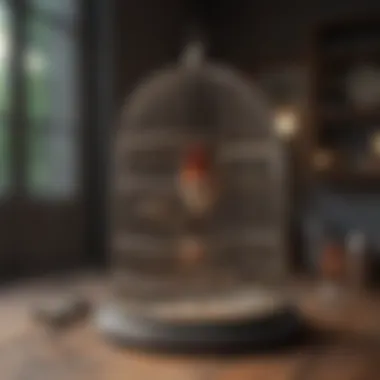
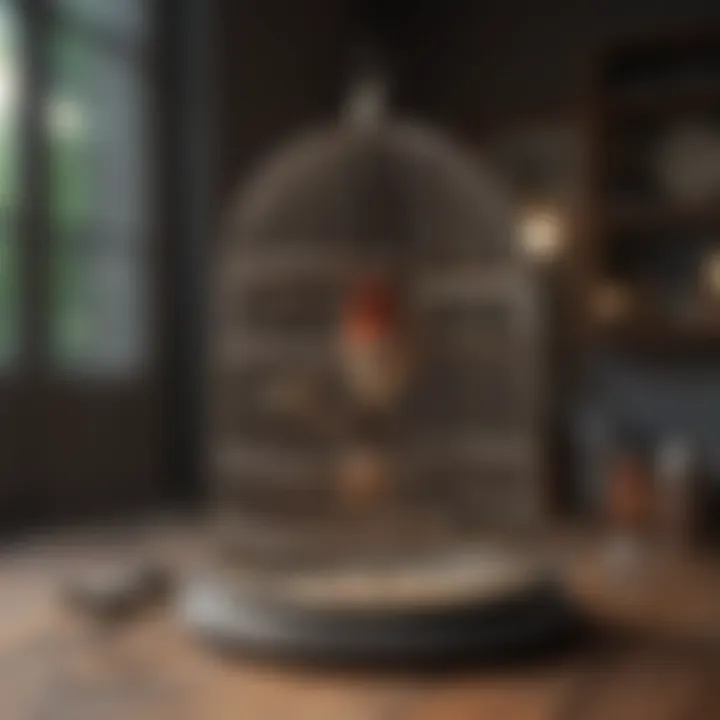
"An ounce of prevention is worth a pound of cure." Keeping tabs on your bird cage door can save you from larger headaches down the road.
In summary, knowing these common issues leading to door replacement can prove invaluable. It promotes quicker resolutions while maintaining your bird’s well-being. Regular checks, preventive measures, and timely replacements enable a secure environment where your birds can thrive.
Choosing the Right Replacement Door
Choosing the right replacement door is fundamental for the longevity and security of any bird cage. A proper door ensures not only the safety of your feathered friends but also enhances the aesthetic appeal of their living space. When it comes to replacement doors, several factors play a pivotal role in making the right choice. The size, material, and design are among the most critical elements that can affect functionality and comfort. Understanding these aspects can make the difference between a secure, attractive cage and one that’s less effective at keeping your birds safe.
Assessing Size and Fit
Getting the size right is the first step in choosing a replacement door. You want to ensure that the door fits snugly within the frame of the bird cage, as gaps can be a security risk. Not to mention, a poorly fitted door can create drafty conditions or even escape routes for your avian companions. To find the correct dimensions, measure the height and width of the existing door or the opening of the cage. Consider not just the dimensions themselves but also the hinges and attachment points since these can influence the ease of installation.
Material Options and Their Benefits
Selecting the material is just as crucial as sizing it correctly. Each option—metal, plastic, and wood—comes with its unique set of advantages and disadvantages that can impact both the cage's security and the comfort of your birds.
Metal
Metal doors can be a robust solution for bird cages. One major characteristic of metal is its durability; it can withstand chewing and biting that come naturally to birds. A metal door is fire-resistant, too, providing an added level of safety in case of emergencies. However, it conducts heat and cold, which may lead to temperature issues if not insulated properly. When choosing metal, look for stainless steel or powder-coated options, as they resist rusting better than others. That said, they can be heavier and slightly more complex to install.
Plastic
Plastic doors are lightweight and easy to handle. Their key characteristic is versatility—they come in various colors and can be molded into different shapes. This flexibility allows for creativity in design while maintaining functionality. Furthermore, they resist moisture, making them less prone to decay compared to wood. Yet, plastic doors may not stand up to voracious chewers and could require replacement sooner than other materials. Additionally, they don’t provide the sturdy feel that you get from metal or wood options.
Wood
Wooden doors present a classic look that many bird owners find attractive. They offer excellent insulation, keeping the cage warm in winter and cool in summer. A significant advantage of wood is that it can be easily customized; owners can paint or stain according to personal taste or match their home decor. However, wood tends to absorb moisture, which can lead to rot over time, so regular maintenance is essential to keep it in good condition. Moreover, wood may not be the best choice for birds that are heavy chewers, as they can dismantle it rather quickly.
Design and Aesthetics Considerations
Finally, the design cannot be overlooked. While functionality and security are paramount, the aesthetic aspect of the replacement door plays a role in your overall enjoyment of your bird cage environment. Consider how the door’s design complements the rest of the cage and your living space. A door that offers visibility, while blending seamlessly with the cage's overall look, can make a significant difference in how you and your bird feel about the living space.
When evaluating designs, also think about features like perches or tunnels that may encourage your birds to engage with their environment positively. A well-thought-out design can enhance their habitat while facilitating bonding between you and your pet birds.
By weighing these elements—size and fit, materials, and design—you're setting yourself up for success in creating a secure and comfortable habitat for your pet birds.
Preparing for Door Replacement
Replacing the door of a bird cage is more than just a simple fix; it’s about ensuring a safe, secure environment for your feathered friends. A well-prepared approach not only simplifies the replacement process but also significantly reduces the chance of errors that could jeopardize your bird's well-being. Getting everything in order before you begin can make all the difference in a smooth replacement experience.
Tools and Materials Required
Before diving into the actual replacement, it’s crucial to gather the right tools and materials. Here’s what you’ll need:
- Screwdriver Set: A variety of screwdrivers (both flathead and Phillips) will help you remove and install screws easily.
- Measuring Tape: Accurate measurements are vital to ensure the new door fits correctly.
- Replacement Door: This should match the original door's size and style; choose the material that you prefer as per your previous considerations.
- Hinges and Locks: Ensure you have the right kind for your new door since these small pieces are crucial for the door's functionality.
- Drill: Handy for those cases where pre-drilled holes are necessary or for creating new ones if needed.
- Safety Goggles: It’s easy to overlook safety, but protecting your eyes is essential when working with tools and small parts.
Having these items ready can save you a trip to the store in the middle of the job.
Measuring Accurately
Now, let’s talk about the importance of measuring accurately. Remember, measure twice, cut once is not just a catchy saying but a golden rule. To avoid delays and frustrations, follow these steps for precise measurements:
- Existing Door Size: Measure the height and width of your old door. This ensures that your replacement door fits seamlessly without gaps. Note any particular shapes, like rounded tops.
- Hinge Placement: Pay attention to where the hinges are located. If your new door will use the same hinges, note their positioning so you can replicate it perfectly.
- Clearance Space: Check the frame of the cage. If the door needs to swing open, make sure there is enough clearance around it, especially if your cage is placed in a tight spot.
If you’re unsure, it’s recommended to double-check everything. A little extra care in measuring can often save a lot of headaches later on.
"A well-prepared bird cage enhances not just security but also the overall living experience for your avian companions."
With the right tools handy and measurements taken with utmost precision, you’ll be ready to embark on the journey of replacing your bird cage door. The next section will cover the practical elements involved in the actual replacement process.
Step-by-Step Guide to Replacing a Bird Cage Door
Replacing a bird cage door is more than just a simple task; it's a pivotal aspect of ensuring the safety and well-being of your feathered companions. A properly functioning door can significantly impact the comfort level of your birds while adding to the overall integrity of the cage structure. This section provides a detailed breakdown of the necessary steps, along with key considerations that every bird owner should keep in mind during the replacement process.
Removing the Old Door
Before you even think about putting in a new door, you need to tackle the old one. The first step is to inspect how the current door is attached. Most bird cage doors will have a hinge mechanism or a latch. Use a screwdriver to carefully unfasten screws or latches that hold the door in place. It's important to do this gently so as not to damage the surrounding cage structure.
Next, you want to handle the old door with care. It might be heavy or awkward to maneuver, especially if it’s made from metal. Lay it aside in a safe area where it won’t be a hazard, especially if any birds are currently roaming about. This prep work sounds basic, but proper removal creates a smoother path for your installation process later on.
Installing the New Door
With the old door gone, it’s time to bring in the new one. Before anything else, you should ensure that this new door is the right size for your cage. Measure twice, and then double-check the fit, just to be on the safe side. Place the new door in position, aligning it with the hinges or locks. It should swing freely without any obstruction.
When you’re sure it fits snugly, proceed to secure it. As you screw or latch the new door into place, do so firmly but be cautious not to over-tighten, as this can warp the material or make future adjustments difficult. This is a good time to think about the skin of your pets as well; ensure that there are no sharp edges that could lead to any accidents. Remember, a smooth sailing door is paramount for everyday ease of access, both for you and your avian friends.
Testing for Secure Closure
Once the new door has been installed, it’s essential to test it thoroughly. Give the door a firm push to ensure it closes correctly and opens smoothly. A functioning door should neither stick nor rattle when in motion. Ensure that any locking mechanisms also work properly to provide a secure closure.
In this step, you might also want to consider the security of your birds. Test the locks more than once and observe how well they stay in place when subjected to gentle pressure. A secure door goes a long way in preventing escapades that could lead to potentially dangerous situations.
"A well-fitted, secure door not only protects your bird but also offers peace of mind to the owner."
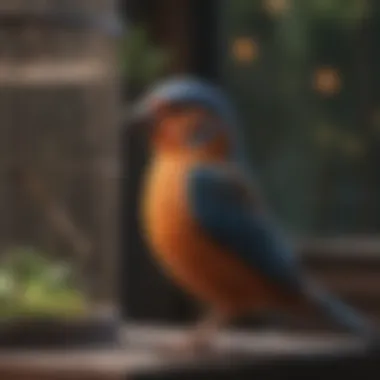
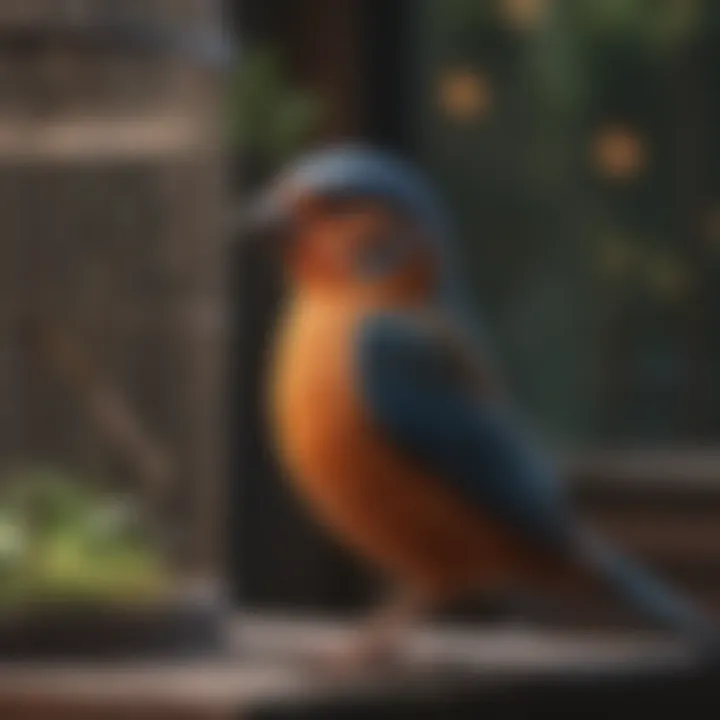
If the door does not close securely, revisit the installation to troubleshoot potential issues. Safety is key; don’t skip this step! Properly testing the door ensures both you and your birds can enjoy a stress-free environment, knowing that all bases are covered and your feathered companions can roam their space safely.
By following these steps, you're not just replacing a door but crafting a safer habitat where your birds can thrive.
Maintenance and Care Post-Replacement
Once you've successfully swapped out the old bird cage door for a replacement, the work doesn't just end there. In fact, that’s just the tip of the iceberg. Engaging in proper maintenance and care following the door replacement is crucial for ensuring a long-lasting and safe environment for your feathered friends. Without diligent attention, even the sturdiest of doors can face issues that compromise your bird’s safety or comfort over time. Let's dive into this important aspect.
Regular Inspections
Starting off, regular inspections shouldn't feel like a chore but rather an essential part of your routine as a bird owner. Checking the door and its surrounding area helps you catch small problems before they grow into larger ones. Think of it as a health checkup for your bird's home.
Inspect for signs of wear around the hinges, locks, and frame. A subtle sign such as a bit of rust on a metal door or loose screws can lead to serious problems if neglected. Here are some guidelines for inspections:
- Frequency: Aim to inspect your bird's cage door at least once a month. If your bird is particularly active or if there are changes in temperature or humidity, consider doing it more often.
- Checklist: Create a list outlining specific parts to check: the door's ability to close securely, the condition of any locks, and the structural integrity of the supporting frame.
- Observe Your Bird: Pay attention to your bird’s behavior. If they seem agitated or show signs of stress, it could indicate an issue with the door or cage setup.
Monitoring conditions will not only protect your bird but can save you from added costs of potential future replacements.
Preventive Measures to Avoid Future Issues
Looking ahead, it’s smart to put preventive measures in place. Keeping your cage door in tip-top shape shouldn’t be just a reactive effort; being proactive can save you a lot of hassle. Some steps you can take:
- Use Bird-Friendly Materials: If you went with wood or metal, ensure they are treated with non-toxic materials that won't chip or peel over time, a big hazard for our little friends.
- Lubrication: Occasionally lubricate hinges and locks with a bird-safe lubricant to prevent sticking or malfunctioning. If you find that a particular part is prone to jamming, a simple dab of oil can do wonders.
- Limit Chewing: If your pet bird likes to chew, consider using protective coverings on the edges or providing them with chewable toys to deter them from targeting the door itself.
- Humidity Control: Depending on your environment, be mindful of humidity levels. Keeping it stable can prevent warping in materials like wood.
By adhering to these methods regularly, you’ll extend the life of your new door and ensure that your loving companions remain safe.
"An ounce of prevention is worth a pound of cure."
When to Consult a Professional
When it comes to replacing a bird cage door, some situations simply call for a professional’s touch. It’s not just about slapping on a new door; there are conditions where DIY efforts might lead to more headaches than solutions. Recognizing when it’s prudent to seek help can save time, resources, and ultimately, prevent possible harm to your beloved feathered friends.
Complex Repairs Beyond DIY
Sometimes a simple door replacement cannot fix the underlying issues plaguing your bird cage. If you find that the cage frame is warped or compromised, or if the door hinges are damaged beyond the point of repair, these are signs that you might need a specialized technician. Attempting to handle such complex repairs without adequate skill or equipment can lead to serious complications.
For instance, if the cage is old and has structural weaknesses, a new door might not fit correctly or safely. Even if the new door looks fine, it might not align correctly, posing risks for escape and injury. A professional can assess the entire cage situation, pinpointing problems you might easily overlook.
In cases where metal cages have corrosion or wear, a pro might have access to techniques for restoration that aren't typically available to the average bird owner. Don't underestimate the intricacies of cage design—sometimes, it’s worth calling in the experts.
Seeking Specialized Advice
Even if you feel confident in your DIY skills, consulting with an expert can bring an added layer of assurance. Specialized advice can help you navigate the nuances of bird cage design, material compatibility, and safety features that are specific to your pet’s needs. Not all cages are created equal, and various species may require different structural support.
When seeking help, consider looking for professionals who understand the specific requirements of avian habitats. An avian veterinarian or an experienced bird breeder can offer insight into the safety standards your new door must meet.
It’s also prudent to consider advice on the materials used. For instance, certain birds have different tolerances to specific metals or plastics. An expert's guidance can ensure that the materials selected for replacements not only fit the aesthetic of your home but also cater to the safety of your birds.
By seeking specialized advice, you can also uncover options you might not have considered, whether it's customizing a door with safety lock features or selecting a more durable material. This investment in knowledge can prove invaluable in securing a joyful, safe environment for your pets.
Important: When in doubt about the structural safety and integrity of your bird cage, professional consultations can provide clarity and safer solutions.
Sourcing Quality Replacement Doors
Finding the right replacement doors for your bird cage is crucial, as it directly influences the safety and well-being of your feathered companions. Many bird owners think any door will do, however, choosing the wrong one can lead to potential hazards like escapes or injuries. A quality replacement door provides not just functionality but peace of mind, ensuring that your birds remain secure within their habitat.
Recommended Retailers and Resources
When it comes to sourcing quality bird cage doors, knowing where to shop can save you time, effort, and often, money. Here are some reliable options:
- Pet Specialty Stores: Many stores like PetSmart or Petco provide a variety of bird cage components, including doors. Staff there are usually knowledgeable about products and can help ensure you choose something safe and suitable.
- Online Retailers: Websites such as Chewy and Amazon offer a extensive range of options. You can often find user reviews which can provide insights into the durability and functionality of a door.
- Local Craftsmanship: If you're looking for something unique, consider local artisans or metalworkers who can create a door tailored specifically to your cage dimensions and style.
- Bird Enthusiast Forums: Websites like Reddit or Facebook groups dedicated to bird care can also have leads on where to find replacement doors, as members share valuable personal experiences and recommendations.
As you navigate through these options, keep an eye out for quality materials and safety features such as secure locking mechanisms and materials that resist chewing.
Cost Considerations
Price can vary significantly for bird cage doors based on a few key factors. Being mindful of your budget is important, but remember, you often get what you pay for. Here's what to consider:
- Material: Metal doors often come with a higher price tag than plastic. However, metal generally offers better durability, especially for aggressive chewers.
- Size and Specifications: Custom sizes tailored to your specific cage can hike up the cost, so measurements should be precise before making any purchase decisions.
- Features: Additional features such as reinforced locks or specialized coatings can impact the price. While these features may seem unnecessary, they can prevent future costs associated with replacements or injuries.
- Shipping Costs: Keep in mind that larger or heavier doors may incur additional shipping fees. Always factor these into your budget.
Ultimately, sourcing the right replacement door involves a balance between quality and cost-efficiency. By making informed decisions and prioritizing safety, you ensure that your birds can enjoy a secure and comfortable home.
"A bird in a safe cage is worth two in the wild."
Taking the time to understand your options will make a world of difference in your bird-keeping journey.
Culmination: Ensuring a Safe Environment for Your Birds
In the grand scheme of keeping birds, ensuring their safety and comfort is paramount. A properly functioning cage door is not just a minor component—it is the gateway to a secure living space for your feathered friends. The importance of replacing a faulty or worn-out bird cage door cannot be overstated. Over time, wear and tear can compromise the integrity of the door, making it susceptible to open unexpectedly or fail to latch properly, thus posing a significant risk to the bird inside.
Safety first! A secure door prevents escapes and accidents, which are not only stressful for birds but can also lead to dire outcomes. If a bird escapes, they can encounter dangers outside, including predators, traffic, or even exposure to the elements. The last thing any bird owner wants is to face such a heart-wrenching scenario.
Moreover, a well-fitted and properly installed door ensures that the environment inside the cage remains stable. Drafts, changes in temperature, or exposure to outside pets and wild birds can create an uncomfortable atmosphere for pet birds. This can lead to stress or health issues over time. Replacing a door may seem like an inconvenient task, but it's a simple way to enhance your birds' quality of life.
When considering the choice of a replacement door, it’s crucial to factor in the quality of materials and design. A robust door can resist wear from pecking or chewing, which is a common behavior among certain bird species. Metals like stainless steel or high-grade aluminum often offer superior durability compared to plastic or wood alternatives. However, these materials can impact the aesthetics of the cage, so choosing one that complements the overall design while fulfilling its purpose is essential.
It's not just about aesthetics or functionality, but also about peace of mind. As a bird owner, knowing you've taken the necessary steps to provide a safe haven for your pets can be incredibly rewarding. Regular inspections and proactive maintenance play a crucial role in this effort. Keeping the cage in good repair isn't just good practice; it reflects a commitment to the well-being of your birds.
In summary, replacing a bird cage door might be a task that is easily overlooked, but its impact is profound. By ensuring the door is secure and functional, you create a safe environment for your birds, thus enriching their lives and yours. After all, these delightful creatures rely on you for their safety and comfort, so invest the time and effort to get it right. Taking these steps ensures that your avian companions live in a secure, happy, and healthy habitat.
"A little effort goes a long way in laying down the safety net for your birds."















